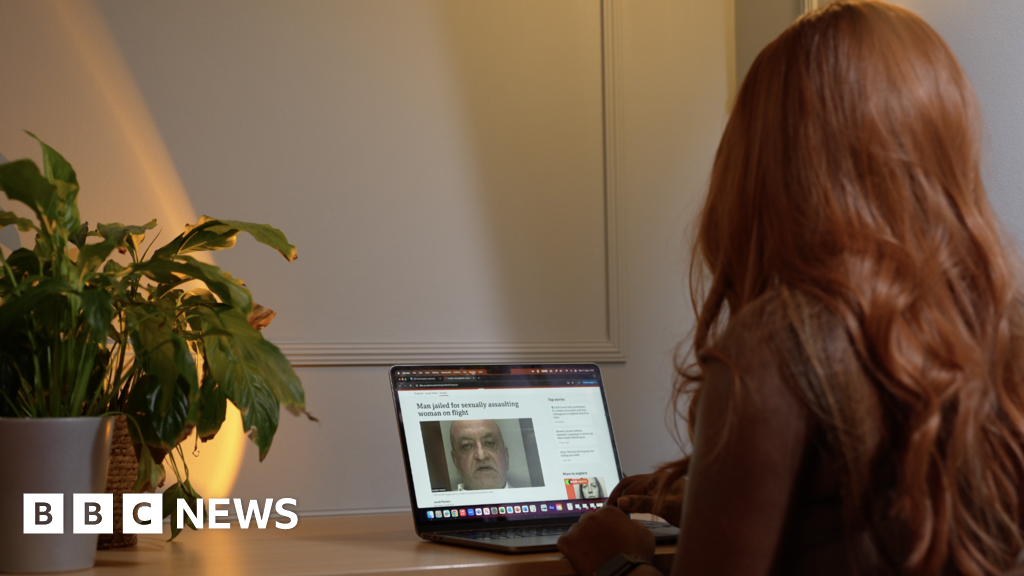Senior UK correspondent
It was September last year when 24-year-old Kelly was on a Qatar Airways flight from Doha to London Gatwick after a trip to Africa.
Tucked underneath a blanket and with her headphones firmly on, she quickly fell asleep after a strenuous day of travel. The quiet murmuring of voices from the film playing on her screen helped her to drift off on a packed overnight flight.
But two hours before landing, Kelly – whose name has been changed for this article – was woken by the man sitting next to her, sexually assaulting her.
The man in his 60s has now been jailed but Kelly is finding it difficult to go on with her day-to-day life and is locked in a battle for compensation.
Speaking about the ordeal for the first time, she tells the BBC the man had pulled a second blanket over both of them before the attack.
“His hands were down my trousers and I said to him, ‘What are you doing?’ I said, ‘Stop’. He said, ‘No, please’. And I had to force his hand out of my trousers and that just made me get up straight away. I left my phone, I left my bag, I left my passport, I left everything. I left my shoes and ran into the toilet, left the door open [and] told the flight attendant,” she says.
Kelly was initially moved to a cabin crew seat before being moved elsewhere in the cabin until landing.
“I had to endure the rest of the plane journey, which was awful,” Kelly remembers. “I was so anxious… anyone that walked by I would instantly panic because I thought it would be him.”
Momade Jussab, 66, was arrested as soon as the flight arrived into Gatwick. He was subsequently charged with one count of sexual assault by penetration and two counts of sexual assault, and was found guilty after a trial in March. He is now serving a six-and-a-half year prison sentence.
Although Kelly is pleased he has been convicted, she said the impact of the assault on her has been severe.
“I haven’t been out in almost a year – to events or summer parties with my friends. I can’t do that. I’m too scared. I don’t want to be touched or looked at. So it’s never leaving me. It’s literally there every single day before I sleep, I’m thinking about what happened.”
No compensation
Kelly is now fighting for compensation under the government’s Criminal Injuries Compensation Scheme (CICS).
The scheme compensates people who have been physically or mentally injured as a result of a violent crime. According to CICS guidance, compensation can be awarded to victims of sexual or physical abuse.
But when Kelly applied to the scheme for compensation in April her application was refused.
A letter from the Criminal Injuries Compensation Authority (CICA) – which processes applications on behalf of the Ministry of Justice – said the offence did not occur in a “relevant place” as defined by the scheme. She appealed against the decision but in May was refused again.
The current rules of the scheme state an aircraft is only considered a “relevant place” if it is a British-registered aircraft within the meaning of section 92 of the Civil Aviation Act 1982. Kelly was told as the offence occurred on a Qatari-registered aircraft, she was ineligible for compensation. She believes this is unfair.
“I understand that he’s been sentenced and he’s done what he’s done and he’s paying the price for that. But what about me? I can’t afford certain therapy,” Kelly said. “I just want to be compensated for what I’ve been through. I want professional help and I want to be heard.”
Her lawyers at the firm Leigh Day argue the decision is “irrational”.
In 1996, the Civil Aviation Act was changed so that crimes committed on foreign planes bound for the UK could be prosecuted in UK criminal courts. This change meant that Jussab could be arrested and charged when the Qatar Airways flight landed at Gatwick last autumn.
But victims in these cases still cannot claim compensation.
Leigh Day wants the change to also apply to the CICS scheme so that people like Kelly can successfully apply for compensation.
It is calling on Justice Secretary Shabana Mahmood to close what it calls a gap in the law.
“Under the current scheme, it appears that a violent sexual assault on a British-registered aircraft is eligible for compensation while a victim of the same violent assault on a foreign registered aircraft – on a UK-bound flight where the perpetrator is prosecuted under UK law – is excluded,” Leigh Day’s Claire Powell said.
She called for this to be changed urgently “in light of this government’s commitment to addressing violence against women and girls”.
A Ministry of Justice spokesperson said: “Our thoughts remain with this victim, and we remain resolute in our mission to halve violence against women and girls in a decade.
“The rules that the Criminal Injuries Compensation Authority follows, and the values of payments for injuries, are set by Parliament. Other routes are available for victims to receive support.”
As well as her fight for compensation, Kelly says she is speaking out to persuade women to be aware of their surroundings, and of others, while travelling on public transport, especially when alone.
“Please be aware. Please be mindful. Don’t be scared, but people are out there that can actually hurt you so always be careful. This could happen to you.”
If you are affected by this article you can access support and information at BBC Action Line
